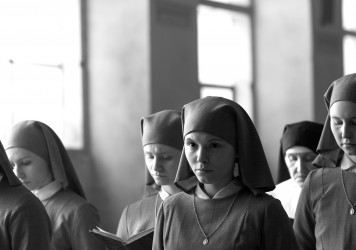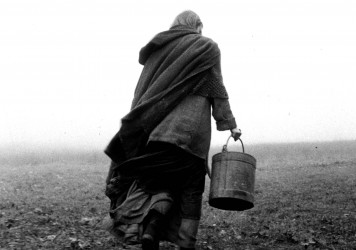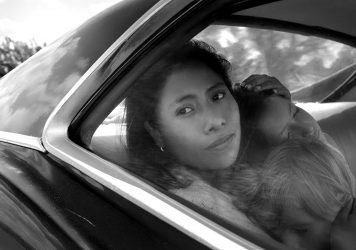A tempestuous romance on national themes makes for chilly viewing in Pawel Pawlikowski’s monochrome drama.
Nationalism, or the question of how and why we love our country, feels extremely apropos in a political moment dominated by demagogues and loonbags. Furthermore, do we love a country with the same fervour, the same illogical impulse, the same sense of tenderness and longing, that we might love another human? This question is posed, albeit obliquely, in Pawel Pawlikowski’s immaculately crafted and highly personal sixth fiction feature, his follow-up to 2013’s massively successful meditation on identity and the legacy of the Holocaust, Ida.
As with that film, Cold War is photographed in smoky monochrome shades and within the stifling, boxy confines of the Academy ratio. The black and white serves the film perfectly as a visual shorthand, as it is a story which straddles the binary divide of Eastern and Western Europe in the years directly following World War Two.
Wiktor (Tomasz Kot) is a Polish musicologist on a mission to preserve the folk songs which offered those on the margins the smallest scintilla of hope during times of conflict. The plan is then to refine and stylise the music by transforming it into a public display of national pride. It is while formulating the show that he meets the enigmatic ice blonde Zula (Joanna Kulig) – arrested but not convicted for killing her father.
As Wiktor falls in love with Zula, he falls out of love with Poland, particularly as the Stalinist propaganda machine is looking to co-opt his work to build a romantic image of the suffering masses. The pair make a plan to flee together and this is when the clever crux of Pawlikowski’s emotionally tumultuous drama is revealed.
Where Ida’s small-scale story had far-reaching rami cations, here the narrative feels much grander as the characters hop between countries in an attempt to find a place where their love feels natural. Yet the lm’s curtness (it runs at an extremely swift 84 minutes) and the liberal use of ellipses between scenes (which expect the viewer to fill in a lot of blanks) serve to stymie the overall impact of a yearning romance which feels displaced from the classical Hollywood era. This is one of those very rare cases where it would have been nice to see some more colour and texture. It is also frustratingly difficult to get a sense of time passing, of things having happened, of events taking their toll on the psyche of the characters. Physically, neither lead seems to age across the film’s two-decade-plus timeframe.
That said, on a moment-by-moment basis, Cold War is often breathtaking, and Pawlikowski has clearly laboured over each and every shot to finesse camera movement, timing, choreography and shot length. A sequence in which Zula, having joined Wiktor in Paris, starts to dance to ‘Rock Around the Clock’ in a nightclub, explodes with energy and passion. It pushes the director’s subtle thesis on the insidiously alluring nature of Western culture and capitalism, and it’s perhaps the film’s most moving moment, even though the intention might not be there. These amazing moments aside, it’s hard not to think that this film needed a little less cold and a little more war.
Published 31 Aug 2018
Pawel Pawlikowski’s follow-up to the all-conquering Ida.
Visually dazzling, but its designer curtness is a hinderance.
All the ingredients are there, but it doesn’t quite come together.

A bracing and powerful drama about cultural roots and the nature of identity from director Pawel Pawlikowski.

By Matt Thrift
Hungarian colossus Béla Tarr’s ‘last film’ is a magnificent, towering achievement.

Alfonso Cuarón delivers his masterpiece with this stunning social fresco centred on a house maid in 1970s Mexico City.